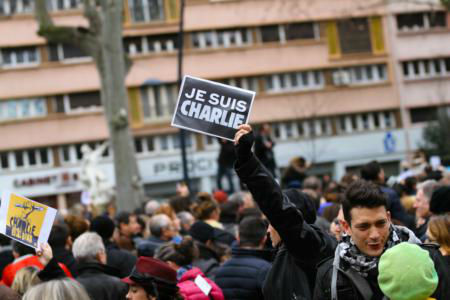Europe and nothingness
In the wake of the horrific jihadist attack on the Paris-based journal Charlie Hebdo, the trope "satirical magazine" was regularly deployed to explain Charlie's character and content. But that's not-quite-right. And what's wrong about it--when linked to the sentiment expressed on placards reading "We are all Charlie Hebdo"--suggests just how much trouble Europe is in, as it confronts this new form of war.
To be sure, French standards of cartooning and "satire" are different than those in other countries, as a brief glance at a Charlie Hebdo cover (and especially those dealing with the Catholic Church, its people, and its beliefs) would demonstrate. Still, I don't think it's a matter of American prissiness to suggest that "satire" doesn't capture the prevailing cast of mind displayed in Charlie Hebdo, which has always struck me as far more nihilistic than satirical.
My venerable Webster's Seventh New Collegiate Dictionary defines "satire" as "a literary work holding up human vices and follies to ridicule or scorn," the secondary definition being "trenchant wit, irony, or sarcasm used to expose and discredit vice or folly." That is not what Charlie Hebdo does. Issue after issue, Charlie Hebdo mocks, not vice and folly (which are fair game), but many people's most deeply held and cherished beliefs, including their religious convictions. I won't describe its cover cartoon lampooning the doctrine of the Trinity after the Catholic bishops of France had opposed so-called "gay marriage;" if that cover was not pornographic, than the word "pornographic" has no meaning.
In the world of Charlie Hebdo, sadly, all religious convictions (indeed all serious convictions about moral truth) are, by definition, fanaticism--and thus susceptible to the mockery of the "enlightened." But that crude caricature of religious belief and moral conviction is false; it's adolescent, if not downright childish; it inevitably lends itself to the kind of vulgarity that intends to wound, not amuse; and over the long haul, it's as corrosive of the foundations of a decent society as the demented rage of the jihadists who murdered members of Charlie Hebdo's staff.
The sophomoric nastiness regularly displayed in Charlie Hebdo most certainly does not constitute any sort of warrant for homicide; the incapacity of some Muslims to live in pluralistic societies and the rage to which those incapacities lead is a grave threat to the West. The question is: what do those two truths have to do with each other?
Here's my suggestion: You can't beat something with nothing--perhaps better, you can't beat something with nothingness.
If all that Europe can say in condemning the despicable murders of Charlie Hebdo's cartoonists and editors is "We are all Charlie Hebdo," then what Europe is saying is, in effect, "We are all nihilists." And how, pray, is nihilism--nothingness raised to a first principle, skepticism taken to the last extreme--supposed to defeat conviction, however warped that conviction is? If all that Europe can say to murderous jihadism is "Why can't we all just get along?" its fecklessness will make it an even softer target for the kind of lethal fanaticism that recently turned Paris into a war zone.
There's another aspect to this tangled and bloody business that's worth noting, and that is the high price that Europe, and France in particular, is paying for culturally engrained (and sometimes legally enforced) political correctness. Virtually proscribing public discussion of the threat to European civility and order posed by Islamist maniacs has made dealing with that threat far more difficult: for citizens, for the security services, and for the public authorities. In the years since 9/11, the French public square has been dominated by the jihadists and the xenophobes; and in that volatile social environment, something very bad was going to happen. Now that it has, perhaps steps can be taken to bring the adults--and the real issues--back into the discussion.
"Liberty, equality, fraternity" can be a noble slogan, bespeaking noble aspirations. But freedom, justice and human solidarity cannot be grounded in nihilism. If all Europe is Charlie Hebdo, then Europe is doomed.
George Weigel is Distinguished Senior Fellow of the Ethics and Public Policy Center in Washington, D.C.
- George Weigel is Distinguished Senior Fellow of the Ethics and Public Policy Center in Washington, D.C.



















